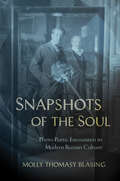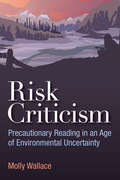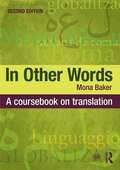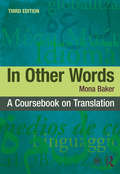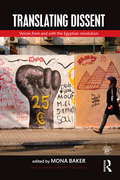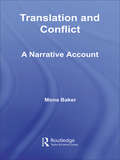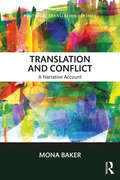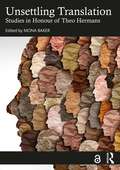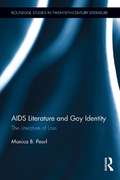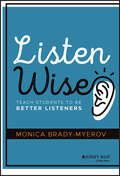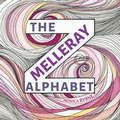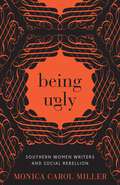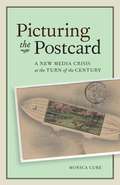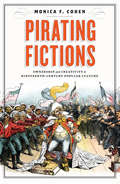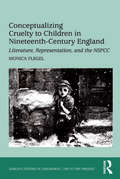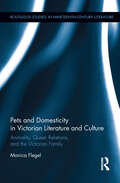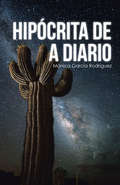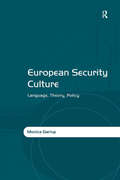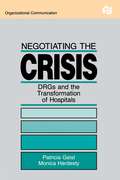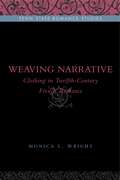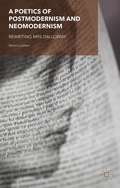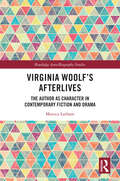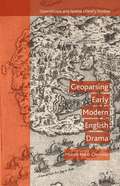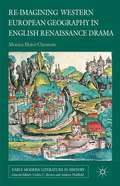- Table View
- List View
Snapshots of the Soul: Photo-Poetic Encounters in Modern Russian Culture
by Molly Thomasy BlasingSnapshots of the Soul considers how photography has shaped Russian poetry from the early twentieth century to the present day. Drawing on theories of the lyric and the elegy, the social history of technology, and little-known archival materials, Molly Thomasy Blasing offers close readings of poems by Boris Pasternak, Marina Tsvetaeva, Joseph Brodsky, and Bella Akhmadulina, as well as by the late and post-Soviet poets Andrei Sen-Sen'kov, Arkadii Dragomoshchenko, and Kirill Medvedev, to understand their fascination with the visual language, representational power, and metaphorical possibilities offered by the camera and the photographic image. Within the context of long-standing anxieties about the threat that visual media pose to literary culture, Blasing finds that these poets were attracted to the affinities and tensions that exist between the lyric or elegy and the snapshot. Snapshots of the Soul reveals that at the core of each poet's approach to "writing the photograph" is the urge to demonstrate the superior ability of poetic language to capture and convey human experience.Open Access edition funded by the National Endowment for the Humanities.
Risk Criticism: Precautionary Reading in an Age of Environmental Uncertainty
by Molly WallaceRisk Criticism is a study of literary and cultural responses to global environmental risk in an age of unfolding ecological catastrophe. In 2015, the Bulletin of the Atomic Scientists reset its iconic Doomsday Clock to three minutes to midnight, as close to the apocalypse as it has been since 1953. What pushed its hands was not just the threat of nuclear weapons, but also other global environmental risks that the Bulletin judged to have risen to the scale of the nuclear, including climate change and innovations in the life sciences. If we may once have believed that the end of days would come in a blaze of nuclear firestorm, we now suspect that the apocalypse may be much slower, creeping in as chemical toxins, climate change, or nano-technologies run amok. Taking inspiration from the questions raised by the Bulletin's synecdochical "nuclear," Risk Criticism aims to generate a hybrid form of critical practice that brings "nuclear criticism" into conversation with ecocriticism. Through readings of novels, films, theater, poetry, visual art, websites, news reports, and essays, Risk Criticism tracks the diverse ways in which environmental risks are understood and represented today.
In Other Words
by Mona BakerIn Other Words is the definitive coursebook for anyone studying translation. Assuming no knowledge of foreign languages, it offers both a practical and theoretical guide to translation studies, and provides an important foundation for training professional translators. Drawing on modern linguistic theory, this best-selling text provides a solid base to inform and guide the many key decisions trainee translators have to make. Each chapter offers an explanation of key concepts, identifies potential sources of translation difficulties related to those concepts, and illustrates various strategies for resolving these difficulties. Authentic examples of translated texts from a wide variety of languages are examined, and practical exercises and further reading are included at the end of each chapter. The second edition has been fully revised to reflect recent developments in the field and new features include: A new chapter that addresses issues of ethics and ideology, in response to increased pressures on translators and interpreters to demonstrate accountability and awareness of the social impact of their decisions. Examples and exercises from new genres such as audiovisual translation, scientific translation, oral interpreting, website translation, and news/media translation. New project-driven exercises designed to support MA dissertation work Updated references and further reading. A companion website featuring further examples and tasks Written by Mona Baker, a leading international figure in the field, this key text is the essential coursebook for any student of translation studies.
In Other Words: A Coursebook on Translation
by Mona BakerIn Other Words is the definitive coursebook for anyone studying translation. Assuming no knowledge of foreign languages, it offers both a practical and theoretical guide to translation studies, and provides an important foundation for training professional translators. Drawing on modern linguistic theory, this best-selling text provides a solid base to inform and guide the many key decisions trainee translators have to make. Each chapter offers an explanation of key concepts, identifies potential sources of translation difficulties related to those concepts, and illustrates various strategies for resolving these difficulties. Authentic examples of translated texts from a wide variety of languages are examined, and practical exercises and further reading are included at the end of each chapter. The second edition has been fully revised to reflect recent developments in the field and new features include: A new chapter that addresses issues of ethics and ideology, in response to increased pressures on translators and interpreters to demonstrate accountability and awareness of the social impact of their decisions. Examples and exercises from new genres such as audiovisual translation, scientific translation, oral interpreting, website translation, and news/media translation. New project-driven exercises designed to support MA dissertation work Updated references and further reading. A companion website featuring further examples and tasks Written by Mona Baker, a leading international figure in the field, this key text is the essential coursebook for any student of translation studies.
In Other Words: A Coursebook on Translation
by Mona BakerIn Other Words has been the definitive coursebook for students studying translation for nearly three decades. Assuming no knowledge of foreign languages, it offers a practical guide based on extensive research in areas as varied as lexis, grammar, pragmatics, semiotics and ethics. It thus provides a solid basis for training a new generation of well-informed, critical students of translation. Drawing on linguistic theory and social semiotics, the third edition of this best-selling text guides trainee translators through the variety of decisions they will have to make throughout their career. Each chapter offers an explanation of key concepts, identifies potential sources of translation difficulties related to those concepts and illustrates various strategies for resolving these difficulties. Authentic examples of translated texts from a wide variety of languages and genres are examined, and practical exercises and further reading are included at the end of each chapter. The third edition has been fully revised to reflect recent developments in the field and includes a new chapter that engages with the interplay between verbal and visual elements in genres as varied as children’s literature, comics, film, poetry and advertisements. This key text remains the essential coursebook for any student of translation studies.
Translating Dissent: Voices From and With the Egyptian Revolution (Critical Perspectives on Citizen Media)
by Mona Baker*Written by the winners of the Inttranews Linguists of the Year award for 2016!* Discursive and non-discursive interventions in the political arena are heavily mediated by various acts of translation that enable protest movements to connect across the globe. Focusing on the Egyptian experience since 2011, this volume brings together a unique group of activists who are able to reflect on the complexities, challenges and limitations of one or more forms of translation and its impact on their ability to interact with a variety of domestic and global audiences. Drawing on a wide range of genres and modalities, from documentary film and subtitling to oral narratives, webcomics and street art, the 18 essays reveal the dynamics and complexities of translation in protest movements across the world. Each unique contribution demonstrates some aspect of the interdependence of these movements and their inevitable reliance on translation to create networks of solidarity. The volume is framed by a substantial introduction by Mona Baker and includes an interview with Egyptian activist and film-maker, Philip Rizk. With contributions by scholars and artists, professionals and activists directly involved in the Egyptian revolution and other movements, Translating Dissent will be of interest to students of translation, intercultural studies and sociology, as well as the reader interested in the study of social and political movements. Online materials, including links to relevant websites and videos, are available at http://www.routledge.com/cw/baker. Additional resources for Translation and Interpreting Studies are available on the Routledge Translation Studies Portal: http://cw.routledge.com/textbooks/translationstudies.
Translation and Conflict: A Narrative Account (Routledge Translation Classics Ser.)
by Mona BakerTranslation and Conflict demonstrates that translators and interpreters participate in circulating as well as resisting the narratives that create the intellectual and moral environment for violent conflict. Drawing on narrative theory and using numerous examples from historical and contemporary conflicts, the author provides an original and coherent model of analysis that pays equal attention to micro and macro aspects of the circulation of narratives in translation, to translation and interpreting, and to questions of dominance and resistance. The study is particularly significant at this juncture of history, with the increased interest in the positioning of translators in politically sensitive contexts, the growing concern with translators’ and interpreters’ divided loyalties in settings such as Guantanamo, Iraq, Kosovo, and other arenas of conflict, and the emergence of several activist communities of translators and interpreters with highly politicized agendas of their own, including Babels, Translators for Peace, Tlaxcala and ECOS. Including further reading suggestions at the end of each chapter, Translation and Conflict will be of interest to students of translation, intercultural studies and sociology as well as the reader interested in the study of social and political movements.
Translation and Conflict: A narrative account (Routledge Translation Classics)
by Mona BakerTranslation and Conflict was the first book to demonstrate that translators and interpreters participate in circulating as well as resisting the narratives that create the intellectual and moral environment for violent conflict and social tensions. Drawing on narrative theory and with numerous examples from historical and current contexts of conflict, Mona Baker provides an original and coherent model of analysis that pays equal attention to the circulation of narratives in translation and to questions of dominance and resistance. With a new preface by Sue-Ann Harding, Translation and Conflict is more than ever the essential text for any student or researcher interested in the study of translation and social movements.
Unsettling Translation: Studies in Honour of Theo Hermans
by Mona BakerThis collection engages with translation and interpreting from a diverse but complementary range of perspectives, in dialogue with the seminal work of Theo Hermans. A foundational figure in the field, Hermans’s scholarly engagement with translation spans several key areas, including history of translation, metaphor, norms, ethics, ideology, methodology, and the critical reconceptualization of the positioning of the translator and of translation itself as a social and hermeneutic practice. Those he has mentored or inspired through his lectures and pioneering publications over the years are now household names in the field, with many represented in this volume. They come together here both to critically re-examine translation as a social, political and conceptual site of negotiation and to celebrate his contributions to the field. The volume opens with an extended introduction and personal tribute by the editor, which situates Hermans’s work within the broader development of critical thinking about translation from the 1970s onward. This is followed by five parts, each addressing a theme that has been broadly taken up by Theo Hermans in his own work: translational epistemologies; historicizing translation; performing translation; centres and peripheries; and digital encounters. This is important reading for translation scholars, researchers and advanced students on courses covering key trends and theories in translation studies, and those engaging with the history of the discipline.
AIDS Literature and Gay Identity: The Literature of Loss (Routledge Studies in Twentieth-Century Literature)
by Monica B. PearlThis book discusses the significance of late twentieth century and early twenty first century American fiction written in response to the AIDS crisis and interrogates how sexual identity is depicted and constructed textually. Pearl develops Freudian psychoanalytic theory in a complex account of the ways in which grief is expressed and worked out in literature, showing how key texts from the AIDS crisis by authors such as Edmund White, Michael Cunningham, Eve Sedgwick – and also, later, the archives of The ACT UP Oral History Project - lie both within the tradition of gay writing and a postmodernist poetics. The book demonstrates how literary texts both expose and construct personal identity, how they expose and produce sexual identities, and how gay and queer identities were written onto the page, but also constructed and consolidated by these very texts. Pearl argues that the division between realist and postmodern, and gay and queer, respectively, is determined by whether the experience expressed and accounted is mediated through the psychoanalytic categories of mourning or melancholia, and is marked by a kind of coherence or chaos in the texts themselves. This study presents an important development in scholarly work in gay literary studies, queer theory, and AIDS representation.
Listen Wise: Teach Students to Be Better Listeners
by Monica Brady-MyerovDiscover how to engage your students effectively by strengthening their listening skills In Listen Wise: Teach Students to Be Better Listeners, journalist, entrepreneur, and author Monica Brady-Myerov delivers a concise and thoughtful treatment of how to build powerful listening skills in K-12 students. You’ll discover real-world examples and modern, research-based advice about helping young people improve their listening abilities and their overall academic performance. With personal anecdotes from the accomplished author and accessible excerpts from the latest neuroscience of listening and auditory learning, the book is a critical resource that will explain why listening is the missing piece of the literacy puzzle. This important book will show you: Classroom stories and teacher viewpoints that highlight effective strategies to teach critical listening Why building listening skills in students is crucial to improving reading, especially for English learners. Why the Lexile Framework for Listening is contributing to a surging recognition of the importance of listening in the academic curriculum Perfect for K-12 teachers looking for new ways to understand their students and how they learn, Listen Wise will also earn a place in the libraries of college and master’s level students in education.
The Melleray Alphabet
by Monica ByrneAn Illuminated Alphabet.Monica Byrne's artfully crafted alphabet gives a whimsical nod to the illuminated manuscripts of ages past. This gorgeous book will take children on an art-filled journey from A to Z. With surprising entries in three languages, children will learn to see their letters--and the world around them--in a brand new light.
Being Ugly: Southern Women Writers and Social Rebellion (Southern Literary Studies)
by Monica Carol MillerIn the South, one notion of “being ugly” implies inappropriate or coarse behavior that transgresses social norms of courtesy. While popular stereotypes of the region often highlight southern belles as the epitome of feminine power, women writers from the South frequently stray from this convention and invest their fiction with female protagonists described as ugly or chastised for behaving that way. Through this divergence, “ugly” can be a force for challenging the strictures of normative southern gender roles and marriage economies. In Being Ugly: Southern Women Writers and Social Rebellion, Monica Carol Miller reveals how authors from Margaret Mitchell to Monique Truong employ “ugly” characters to upend the expectations of patriarchy and open up more possibilities for southern female identity. Previous scholarship often conflates ugliness with such categories as the grotesque, plain, or abject, but Miller disassociates these negative descriptors from a group of characters created by southern women writers. Focusing on how such characters appear prone to rebellious and socially inappropriate behavior, Miller argues that ugliness subverts assumptions about gender by identifying those who are unsuitable for the expected roles of marriage and motherhood. As opposed to familiar courtship and marriage plots, Miller locates in fiction by southern women writers an alternative genealogy, the ugly plot. This narrative tradition highlights female characters whose rebellion offers a space for re-imagining alternative lives and households in opposition to the status quo. Reading works by canonical writers like Zora Neale Hurston, Flannery O’Connor, and Eudora Welty, along with recent texts by contemporary authors like Helen Ellis, Lee Smith, and Jesmyn Ward, Being Ugly offers an important new perspective on how southern women writers confront regressive ideologies that insist upon limited roles for women.
Picturing the Postcard: A New Media Crisis at the Turn of the Century
by Monica CureThe first full-length study of a once revolutionary visual and linguistic medium Literature has &“died&” many times—this book tells the story of its death by postcard. Picturing the Postcard looks to this unlikely source to shed light on our collective, modern-day obsession with new media. The postcard, almost unimaginably now, produced at the end of the nineteenth century the same anxieties and hopes that many people think are unique to twenty-first-century social media such as Facebook or Twitter. It promised a newly connected social world accessible to all and threatened the breakdown of authentic social relations and even of language. Arguing that &“new media&” is as much a discursive object as a material one, and that it is always in dialogue with the media that came before it, Monica Cure reconstructs the postcard&’s history through journals, legal documents, and sources from popular culture, analyzing the postcard&’s representation in fiction by well-known writers such as E. M. Forster and Edith Wharton and by more obscure writers like Anne Sedgwick and Herbert Flowerdew. Writers deployed uproar over the new medium of the postcard by Anglo-American cultural critics to mirror anxieties about the changing nature of the literary marketplace, which included the new role of women in public life, the appeal of celebrity and the loss of privacy, an increasing dependence on new technologies, and the rise of mass media. Literature kept open the postcard&’s possibilities and in the process reimagined what literature could be.
Pirating Fictions: Ownership and Creativity in Nineteenth-Century Popular Culture (Victorian Literature and Culture Series)
by Monica F. CohenTwo distinctly different meanings of piracy are ingeniously intertwined in Monica Cohen's lively new book, which shows how popular depictions of the pirate held sway on the page and the stage even as their creators were preoccupied with the ravages of literary appropriation. The golden age of piracy captured the nineteenth-century imagination, animating such best-selling novels as Treasure Island and inspiring theatrical hits from The Pirates of Penzance to Peter Pan. But the prevalence of unauthorized reprinting and dramatic adaptation meant that authors lost immense profits from the most lucrative markets. Infuriated, novelists and playwrights denounced such literary piracy in essays, speeches, and testimonies. Their fiction, however, tells a different story.Using landmarks in copyright history as a backdrop, Pirating Fictions argues that popular nineteenth-century pirate fiction mischievously resists the creation of intellectual property in copyright legislation and law. Drawing on classic pirate stories by such writers as Walter Scott, James Fenimore Cooper, Robert Louis Stevenson, and J. M. Barrie, this wide-ranging account demonstrates, in raucous tales and telling asides, how literary appropriation was celebrated at the very moment when the forces of possessive individualism began to enshrine the language of personal ownership in Anglo-American views of creative work.
Conceptualizing Cruelty to Children in Nineteenth-Century England: Literature, Representation, and the NSPCC (Studies in Childhood, 1700 to the Present)
by Monica FlegelMoving nimbly between literary and historical texts, Monica Flegel provides a much-needed interpretive framework for understanding the specific formulation of child cruelty popularized by the National Society for the Prevention of Cruelty to Children (NSPCC) in the late nineteenth century. Flegel considers a wide range of well-known and more obscure texts from the mid-eighteenth century to the early twentieth, including philosophical writings by Locke and Rousseau, poetry by Coleridge, Blake, and Caroline Norton, works by journalists and reformers like Henry Mayhew and Mary Carpenter, and novels by Frances Trollope, Charles Dickens, Wilkie Collins, and Arthur Morrison. Taking up crucial topics such as the linking of children with animals, the figure of the child performer, the relationship between commerce and child endangerment, and the problem of juvenile delinquency, Flegel examines the emergence of child abuse as a subject of legal and social concern in England, and its connection to earlier, primarily literary representations of endangered children. With the emergence of the NSPCC and the new crime of cruelty to children, new professions and genres, such as child protection and social casework, supplanted literary works as the authoritative voices in the definition of social ills and their cure. Flegel argues that this development had material effects on the lives of children, as well as profound implications for the role of class in representations of suffering and abused children. Combining nuanced close readings of individual texts with persuasive interpretations of their influences and limitations, Flegel's book makes a significant contribution to the history of childhood, social welfare, the family, and Victorian philanthropy.
Pets and Domesticity in Victorian Literature and Culture: Animality, Queer Relations, and the Victorian Family (Routledge Studies in Nineteenth Century Literature)
by Monica FlegelAddressing the significance of the pet in the Victorian period, this book examines the role played by the domestic pet in delineating relations for each member of the "natural" family home. Flegel explores the pet in relation to the couple at the head of the house, to the children who make up the family’s dependents, and to the common familial "outcasts" who populate Victorian literature and culture: the orphan, the spinster, the bachelor, and the same-sex couple. Drawing upon both animal studies and queer theory, this study stresses the importance of the domestic pet in elucidating normative sexuality and (re)productivity within the familial home, and reveals how the family pet operates as a means of identifying aberrant, failed, or perverse familial and gender performances. The family pet, that is, was an important signifier in Victorian familial ideology of the individual family unit’s ability to support or threaten the health and morality of the nation in the Victorian period. Texts by authors such as Clara Balfour, Juliana Horatia Ewing, E. Burrows, Bessie Rayner Parkes, Anne Brontë, George Eliot, Frederick Marryat, and Charles Dickens speak to the centrality of the domestic pet to negotiations of gender, power, and sexuality within the home that both reify and challenge the imaginary structure known as the natural family in the Victorian period. This book highlights the possibilities for a familial elsewhere outside of normative and restrictive models of heterosexuality, reproduction, and the natural family, and will be of interest to those studying Victorian literature and culture, animal studies, queer studies, and beyond.
HIPÓCRITA DE A DIARIO
by Monica Garcia RodriguezMi hija tiene un diario en el que escribe casi a diario... Empezamos mal, esto nunca llegará a ser un bestseller. <P><P> Arturo, un hombre que olvidó que tenía sentido del humor, comienza a sus 42 años, a escribir un diario con el fin de dar cuerpo a un propósito: enviar a su jefe a la cárcel y restregarle todas las palabras escritas que nunca se atrevió a decirle. <P><P>Paralelamente a este cometido se da cuenta de que le ha cogido gustillo a la escritura y desarrolla una serie de relatos inspirados en sueños, en las historias de los personajes que van apareciendo en su vida, e incluso en aquellas ideas que le consiguen liberar poco a poco de su hipócrita realidad. <P>Para ello diseña en la última mitad de su diario un desván imaginativo que acabará cargado de la moral, el amor, la furia, la rebeldía, la ironía y el talante, del propio Arturo.
European Security Culture: Language, Theory, Policy
by Monica GariupGrounded on tenets of cultural realism and social constructivism, Monica Gariup develops a theoretical framework to enhance our understanding of security culture at the European Union level. She employs tools from political theory, linguistic analysis and international relations theory to examine the implications of discourse and practice in European Security and Defense Policy (ESDP). Innovative in scope, the volume analyzes whether elaborating a structurationist solution and proposing a discursive syntax of security makes it possible to identify and compare different types of security actors. Providing a comprehensive and objective analysis on the links and implications between the discourse and actual policy of the ESDP, this is essential reading for scholars and researchers in European politics, international relations, security and cultural studies.
Negotiating the Crisis: Drgs and the Transformation of Hospitals (Routledge Communication Series)
by Patricia Geist Monica HardestyIn 1984 Congress revamped Medicare to save a financially distraught health care system, thus transforming the hospital as an organization. Diagnosis Related Groups (DRGs) -- the cornerstone of this extensive reorganization -- have triggered repercussions that are still adversely affecting health care professionals. This volume cuts to the heart of this crisis, examining the difficulties and foibles of going from DRG Legislation to DRG practices and giving voice to the professionals who must carve out a new reality under DRGs. It exposes the disputes between the various professional groups -- administrators, physicians, and nurses --over the implementation of DRGS, and how these professionals maneuver to manage the health service problems created by the policy. The book's authors provide an insightful analysis of the way policy innovations can wreak havoc on an organization and how professionals working together eventually negotiate order out of the chaos of change. The volume's narrative style of research is one feature that makes the presentation of the authors' findings unique from other works on Medicare legislation. Additionally, the book offers a case study approach to communication and sociological matters of a significant health care issue.
Weaving Narrative: Clothing in Twelfth-Century French Romance (Penn State Romance Studies #10)
by Monica L. WrightEnide’s tattered dress and Erec’s fabulous coronation robe; Yvain’s nudity in the forest, which prevents maidens who know him well clothed from identifying him; Lanval’s fairy-lady parading about in the Arthurian court, scantily dressed, for all to observe: just why is clothing so important in twelfth-century French romance? This interdisciplinary book explores how writers of this era used clothing as a signifier with multiple meanings for many narrative purposes. Clothing figured prominently in twelfth-century France, where exotic fabrics and furs came to define a social elite. Monica Wright shows that representations of clothing are not mere embellishments to the text; they help form the textual weave of the romances in which they appear. This book is about how these descriptions are constructed, what they mean, and how clothing becomes an active part of romance composition—the ways in which writers use it to develop and elaborate character, to advance or stall the plot, and to structure the narrative generally.
A Poetics of Postmodernism and Neomodernism
by Monica LathamVirginia Woolf's Mrs Dalloway, one of the most significant modernist texts from the Western literary canon, has spawned numerous contemporary offspring. Contemporary authors have dialogued with it, challenged it, reinvented it and offered creative responses to it, thus reinforcing its accumulated critical reputation and canonical status. After meticulously tracing the genesis of Woolf's most iconic novel so as to examine the production of Woolf's idiosyncratic Dalloway-esque signature, A Poetics of Postmodernism and Neomodernism sets out to explore its reproduction by a variety of postmodernist and neomodernist Anglo-American writers who are either openly indebted to Woolf's novel or covertly influenced by it. The contemporary tributes that are indebted to Mrs Dalloway in so many ways have rejuvenated the Woolfian novel and have propelled it into the twenty-first century. Almost a hundred years after its publication, Woolf's Mrs Dalloway has proved to be an enduring text, an 'ice-breaking vessel' which continues to invite 'individual talents' to follow in its wake.
Virginia Woolf’s Afterlives: The Author as Character in Contemporary Fiction and Drama (Routledge Auto/Biography Studies)
by Monica LathamThis book explores Virginia Woolf’s afterlives in contemporary biographical novels and drama. It offers an extensive analysis of a wide array of literary productions in which Virginia Woolf appears as a fictional character or a dramatis persona. It examines how Woolf’s physical and psychological features, as well as the values she stood for, are magnified, reinforced or distorted to serve the authors’ specific agendas. Beyond general theoretical issues about this flourishing genre, this study raises specific questions about the literary and cultural relevance of Woolf’s fictional representations. These contemporary narratives inform us about Woolf’s iconicity, but they also mirror our current literary, cultural and political concerns. Based on a close examination of twenty-five works published between 1972 and 2019, the book surveys various portraits of Woolf as a feminist, pacifist, troubled genius, gifted innovative writer, treacherous, competitive sister and tragic, suicidal character, or, on the contrary, as a caricatural comic spirit, inspirational figure and perspicacious amateur sleuth. By resurrecting Virginia Woolf in contemporary biofiction, whether to enhance or debunk stereotypes about the historical figure, the authors studied here contribute to her continuous reinvention. Their diverse fictional portraits constitute a way to reinforce Woolf’s literary status, re-evaluate her work, rejuvenate critical interpretations and augment her cultural capital in the twenty-first century
Geoparsing Early Modern English Drama
by Monica Matei-ChesnoiuGeo-spatial identity and early Modern European drama come together in this study of how cultural or political attachments are actively mediated through space. Matei-Chesnoiu traces the modulated representations of rivers, seas, mountains, and islands in sixteenth-century plays by Shakespeare, Jasper Fisher, Thomas May, and others.
Re-imagining Western European Geography in English Renaissance Drama
by Monica Matei-ChesnoiuFocusing on how citizens of early modern England tried to locate themselves and their nation through geography and travel writing, Monica Matei-Chesnoiu explores theatrical representations of Western European space and ethnography. Geographic discourses share many features with drama in that they appeal to the readers' and audience's curiosity and imagination. Playwrights use information derived from geography treatises as vehicles to allegorize contemporary English issues in a dialogical mode. While geography and travel texts provide an objective synthesis in describing Western European nations, dramatic interaction destabilizes any preconceived notions and submits contrastive views on imagined global European communities. This book explores representations of France, Spain, Germany, the Low Countries, and Denmark in a wide range of geography texts and offers fresh readings of Shakespeare, Jonson, Marlowe, Middleton, Dekker, Massinger, Marston, and others.
